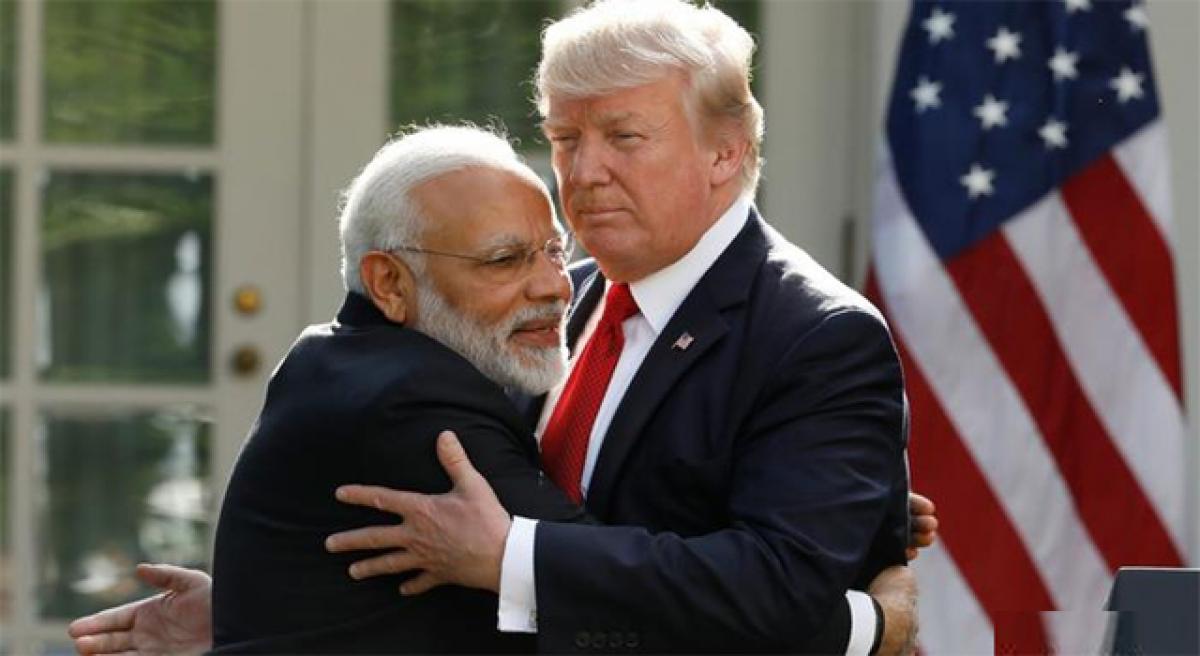Live
- Chanchalguda Jail Officials Say They Haven't Received Bail Papers Yet, Allu Arjun May Stay in Jail Tonight
- BJP leaders present evidence of illegal voters in Delhi, urge EC for swift action
- Exams will not be cancelled: BPSC chairman
- Nagesh Trophy: Karnataka, T.N win in Group A; Bihar, Rajasthan triumph in Group B
- YS Jagan condemns the arrest of Allu Arjun
- Economic and digital corridors to maritime connectivity, India and Italy building vision for future, says Italian Ambassador
- SMAT 2024: Patidar's heroics guide Madhya Pradesh to final after 13 years
- CCPA issues notices to 17 entities for violating direct selling rules
- Mamata expresses satisfaction over speedy conviction in minor girl rape-murder case
- Transparent Survey Process for Indiramma Housing Scheme Directed by District Collector
Just In

Since the late 1990s, bilateral ties between India and the United States have blossomed under successive Republican and Democratic administrations. They have strengthened and deepened to such an extent that, on his first visit to India in 2009, President Barack Obama characterised the relationship between the two great nations as \"one of the defining partnerships for the 21st century\".
Since the late 1990s, bilateral ties between India and the United States have blossomed under successive Republican and Democratic administrations. They have strengthened and deepened to such an extent that, on his first visit to India in 2009, President Barack Obama characterised the relationship between the two great nations as "one of the defining partnerships for the 21st century".
Because of Donald Trump's unexpected election as US President, 2017 began with serious questions about the future of that partnership. This was due to the President-elect's vow as a candidate to rewrite many treaties and to bring about sweeping changes to America's international commitments.
During a campaign event, Trump had pledged to his Indian-American supporters that he would work to reinforce and improve relations with India. Nonetheless, his professed America First policy and attacks on H-1B visas created some apprehension in New Delhi about the direction his administration would take with regard to India.
The Trump administration and Narendra Modi’s government deserve credit for sustaining this momentum. They accomplished this by focusing mainly on areas where they are on the same page -- such as cooperation on defence and terrorism -- and not letting issues such as H-1B become irritants.
President Obama had hosted the Prime Minister at the White House in 2016. Prior to that, in 2015, Obama had visited New Delhi at the Republic Day celebrations. As a result of these interactions, Modi had forged a good rapport with President Obama.
Whether Modi -- a practitioner of personal diplomacy who believes in nourishing and nurturing friendships with world leaders -- would succeed in establishing a similar rapport with Trump was on everyone's mind, prior to their get-together.
This is evidence that the evolving India-U.S. relationship is on solid ground. A pair of high-level visits to India provided additional evidence. In September, Secretary of Defence James Mattis became the first senior cabinet member of the Trump administration to visit India. In late October, Secretary of State Tillerson was in New Delhi on his maiden visit.
A third piece of evidence of the high priority given to the India relationship by the US was the naming of Kenneth Juster as America's 25th Ambassador to New Delhi in September. Though the delay in nominating an envoy -- the position remained vacant for more than eight months -- had raised concern among India watchers, Juster's appointment was universally welcomed in both New Delhi and Washington.
The progress on the India-US front was not limited to the political and policy arena. Importantly, another positive trend for the year was the continued uptick in trade between the two countries. By the end of October, the bilateral trade in goods was more than $62.2 billion, a 10 percent increase from the same 10-month period in 2016. This is a powerful signal that trade will remain a cornerstone in relations in the years to come.
In summary, 2017 has been a good year for the evolving India-US "partnership". Speaking for the White House at the Summit, Deputy Press Secretary Raj Shah stated that the countries have a "strong relationship that is going to get stronger". Shah also said that the US-India relationship should "not be contingent" on any other relationship.
Actions speak louder than words. In 2017, the reality has aligned with the rhetoric. The seeds have been planted and are being nurtured for an even stronger and more substantial alliance between India and the US. in the future.
This is not a guarantee that 2018 will bring bigger and better things for the India-US "partnership". Factors such as domestic concerns and/or unrest within either country or an international incident could impede progress going forward.
At this point in time, however, it can be stated that this "defining partnership" continues to be defined and that is a good thing. (The writer is a Washington-based thought leader)
By Frank F Islam

© 2024 Hyderabad Media House Limited/The Hans India. All rights reserved. Powered by hocalwire.com







